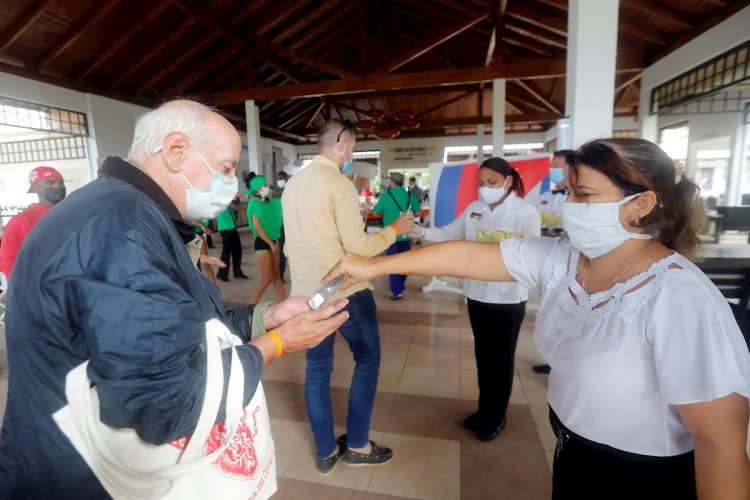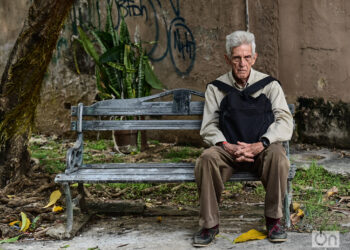Tourists arriving in Cuba as of November 15 will have to present a certificate of vaccination against COVID-19 or a negative PCR carried out 72 hours prior to their arrival on the island, authorities of the sector explained this Thursday.
The measure is part of the protocols that will be applied with international visitors as of the middle of the eleventh month of the year, when the Cuban government hopes the country will present a better epidemiological situation and a high vaccination coverage against the infectious disease.
A few days before, when announcing a gradual reopening of the borders, the Cuban Ministry of Tourism (MINTUR) had advanced that a PCR test result would not be required upon arrival and that diagnostic tests among travelers would be carried out randomly, as part of a “flexibility” of the protocols, which set off the alarms of a great deal of the Cuban population.
Now, María del Pilar Macías, Director of Operations and Quality of the MINTUR, confirmed that “the COVID-19 vaccination certificate will be required from tourists upon arrival on the island,” while visitors who are not vaccinated will have to present a negative PCR result performed 72 hours before arrival,” the official Cubadebate website reported.
Se flexibilizan los protocolos de entrada al país, teniendo en cuenta el avance de la vacunación en los principales países emisores de turismo y la vacunación en nuestro país, se logra elevar el nivel inmunitario de las personas. #TurismoInforma #TurismoCubano #CubaTravel
— Ministerio Turismo (@MinturCuba) September 9, 2021
During her appearance on the Mesa Redonda television program, the official confirmed that at the border the protocols “will be focused on monitoring of symptomatic patients and taking temperature” and that, in addition, “diagnostic tests will be carried out at random.”
She also detailed that in the event that a tourist is positive in one of the random tests, he will be transferred to a hotel facility authorized by the MINTUR, in conjunction with the Ministry of Public Health (MINSAP), for the isolation and medical care of the sick.
Macías said that, beyond the border changes, the sanitary protocols for tourist activity on the island, drawn up with MINSAP, “reinforce” their exigency based on “the recommendations of the World Organizations of Tourism and Health, the operators established in the country and the tour operators of the main issuing countries.”
In them, measures such as the use of protective means like masks and gloves, separation with physical means such as screens, disinfection for hands and surfaces, physical distancing with the help of signs in common areas, the use of open areas to carry out animation activities and the reduction of the capacity of the restaurants will be maintained. There will also be round-the-clock medical services in the hotels.
The official said that these measures are intended to increase security and prevent infections, “without closing any service or causing discomfort to customers.”
Se actualizan y refuerzan los protocolos de actuación para la protección de los trabajadores del turismo en contacto con los clientes, para prevenir y cortar cualquier posible cadena de contagio trabajador-población.#TurismoInforma #TurismoCubano #CubaTravel
— Ministerio Turismo (@MinturCuba) September 9, 2021
In addition, Macías said that with a view to protecting workers in the sector, vaccination has been extended to the tourist destinations and territories where the process had not started — until now there are around 45,000 immunized people — and booster doses will be applied to those linked to this activity.
She added that, as part of the program for a more hygienic and safe tourism, to date more than 2,250 facilities have been certified, 563 of them from the private sector, and that before November 15 they will be checked, including those that have been closed during the pandemic.
The tourism authorities explained that greater mobility of visitors and the possibility of city excursions will be allowed, although without specifying how this will be done or if there will be specific protocols for these activities, which arouse concern among many Cubans, who fear a new outbreak of COVID-19 based on imported cases.
In this sense, Minister of Tourism Juan Carlos Granda acknowledged on the Mesa Redonda that “there is concern with the word ‘flexibility’ upon the arrival of travelers,” but he insisted that “it is not necessarily so.”
“The protocols implemented in the tourism sector since the beginning of the pandemic are not made more flexible, but rather reinforced. It is not making it more flexible, it is changing protocols upon arrival, in mobility,” he commented.
Turistas rusos volarán a República Dominicana, con posible perjuicio para Cuba
Granda reiterated the importance for the Cuban economy of a “take-off” of tourism, due to its “dynamic” and “strategic” role, and explained that, from January 1 to August 31, only 163,743 international visitors entered Cuba. This means 2,960,000 fewer tourists than in the same period of 2019, and 824,000 less than in the first eight months of 2020, with its corresponding monetary impact in pandemic conditions.
Cuba, which is going through a severe economic and health crisis, has one of its main sources of income in tourism, which has been badly hit by the impact of COVID-19.
Currently, only a few facilities in destinations such as Varadero and Cayo Coco are offering their services to visitors mainly from Russia and, to a lesser extent, from Canada and European countries, while the island is going through its worst moment of the entire pandemic, with thousands of cases and dozens of deaths per day, according to official statistics.











What about 2 different vaccine?